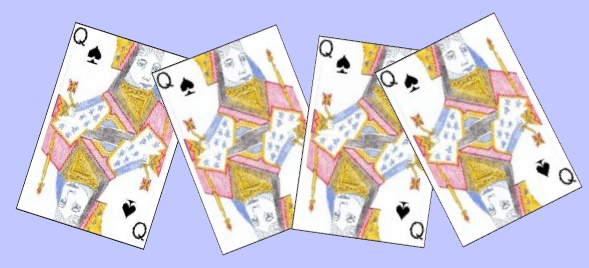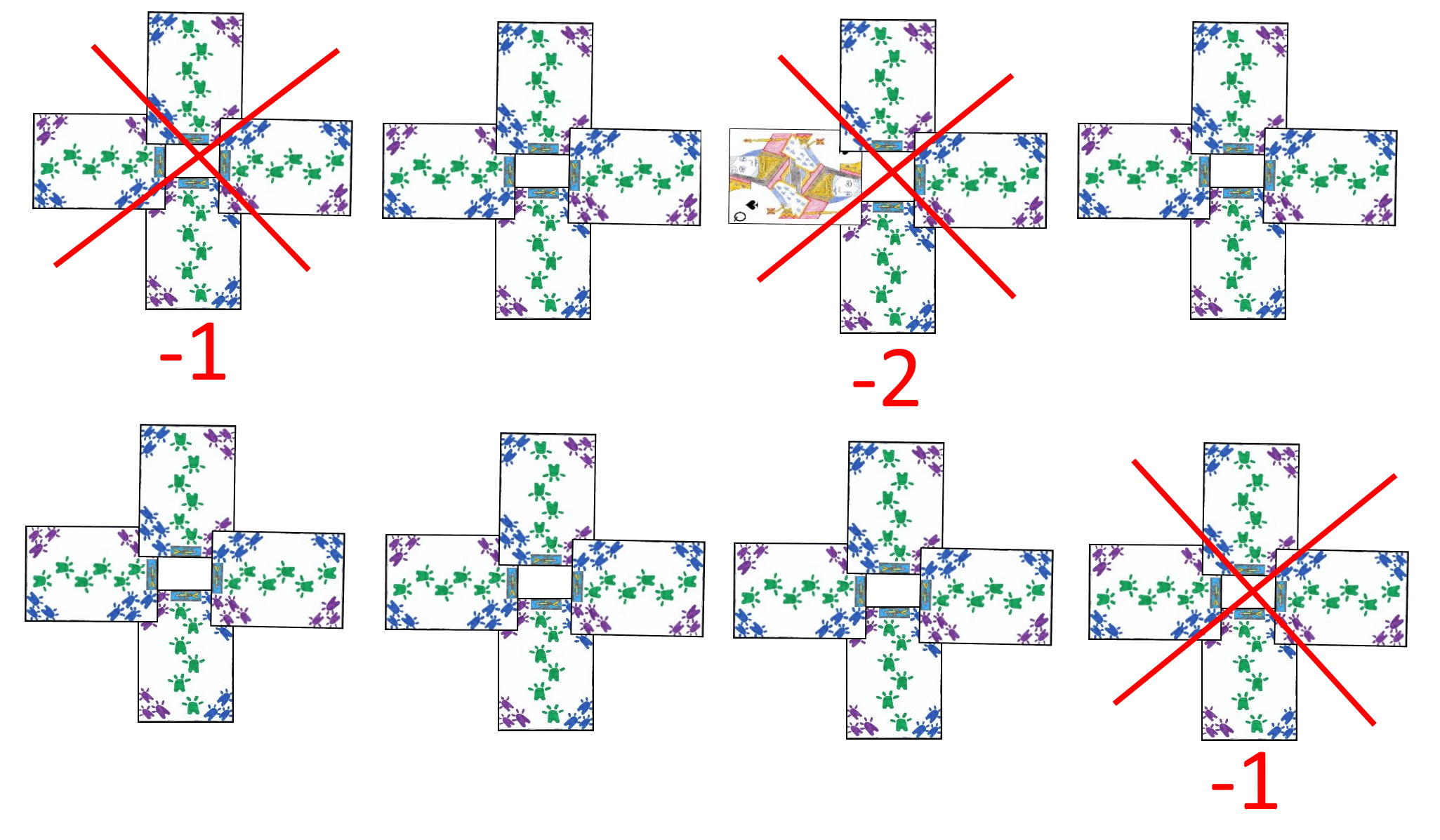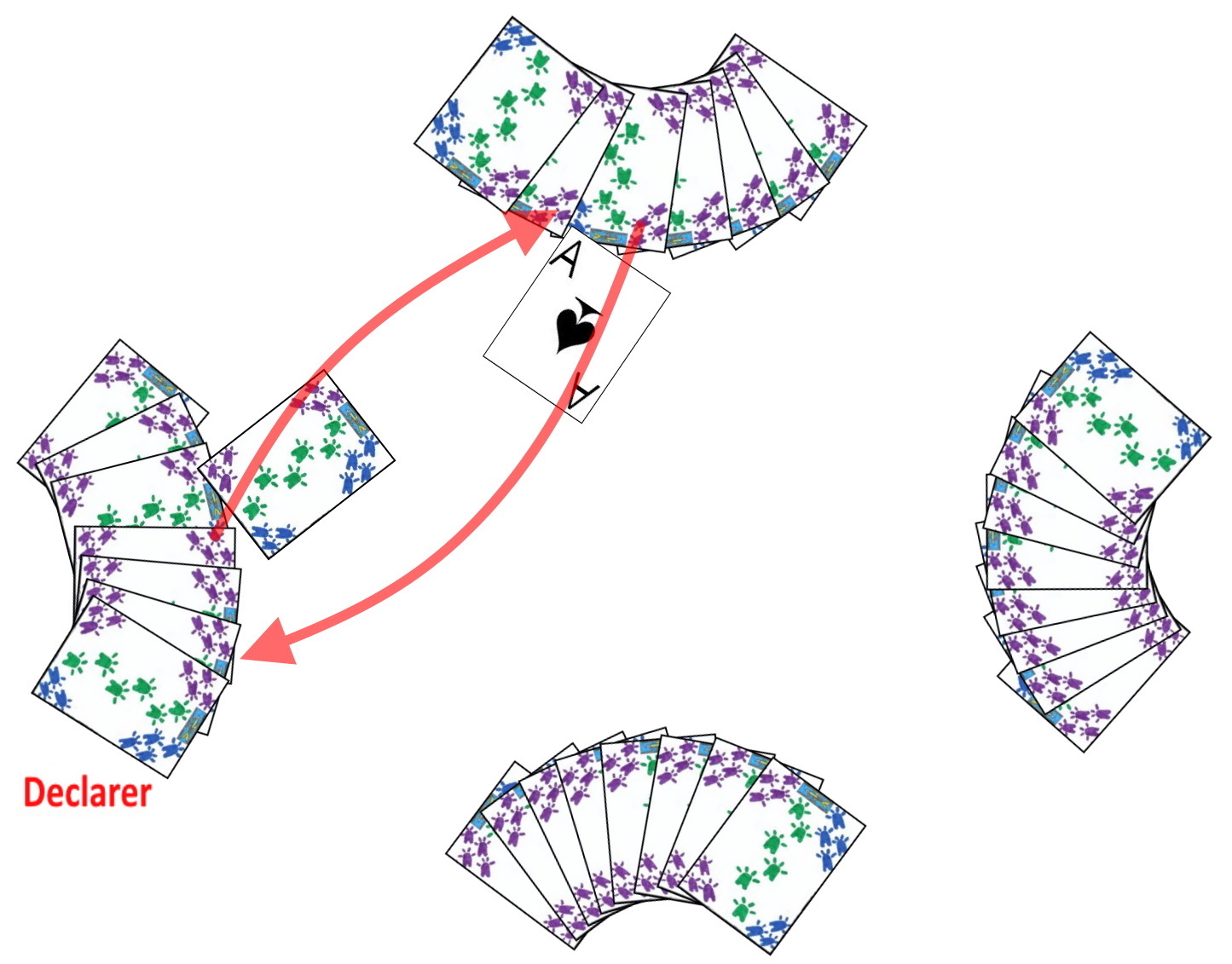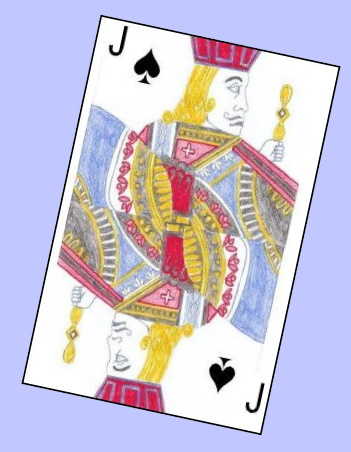 Grasobern is a card game from Germany which at one time was quite popular. Although somewhat less commonly played today, it is still often played in certain areas of Germany, particularly Eastern Bavaria. Grasobern is also commonly known by several other names, including Grunübern, Grasoberl, Laubobern, Lauboberl and Graseberla.
Grasobern is a card game from Germany which at one time was quite popular. Although somewhat less commonly played today, it is still often played in certain areas of Germany, particularly Eastern Bavaria. Grasobern is also commonly known by several other names, including Grunübern, Grasoberl, Laubobern, Lauboberl and Graseberla.
Grasobern is traditionally played with the 32 card German deck. This German deck is somewhat similar to the more commonly known French deck, but has several significant differences. The most obvious difference is that the German pack uses a different set of suits, which are Acorns, Leaves, Hearts and Bells. Another difference is that the specific ranking of cards in the deck is different, with the following rank used in the German deck (listed in order from highest to lowest ranked): Sow, King, Ober, Unter, 10, 9, 8, 7.
If such a traditional German deck is not at hand, a standard French deck can also be used, by removing all cards lower than the rank of 7 from that deck. The ranking of the remaining cards as found in that deck are as follows (shown from high to low): Ace, King, Queen, Jack, 10, 9, 8, 7.
Grasobern is usually played by four players, each playing independently. Determination of seating positions and first dealer can be performed using a variety of methods, with draw for high cards commonly used. In this method, each player draws a card from the shuffled deck. Any players drawing a card of the same rank as that of other players should discard and redraw until all players have drawn a unique card. The players then seat themselves at the table in precedence order from highest card drawn to lowest. The player drawing the highest card of all is set as the first dealer. Thereafter, the role of dealer rotates in a clockwise direction after each hand.
Once the dealer has been determined, this player thoroughly shuffles the cards and offers the deck to the player at his immediate right to cut. If that player elects not to cut, he simply knocks on the top of the deck and passes it back to the dealer. After the cut, the dealer begins dealing the cards in a clockwise direction around the table, starting with the player to his left. The cards are dealt in face-down packets of four cards, and continues until each player has received two such four card packets (eight cards in total to each player).
After each player has received the requisite eight cards, a round of bidding begins, starting with the player at the dealer's immediate left (called the Vorhand or forehand) and continuing in a clockwise direction. During this round of bidding each player has exactly one opportunity to either Pass or indicate he intends to play the hand in one of the special contract types of Mord (also called Rufmord), Bettel or Herrenbettel. A bid of Mord outranks a bid of Herrenbettel which outranks a bid of Bettel. The player who made the highest ranking bid is set as the declarer and his bid is the Contract for the hand. If two or more players all bid that same high amount, the first player to make such a bid is set as the declarer for the hand. The goal and play of the hand are directly dependent on the game type to be played during the hand, as follows:
- Normal Game: In the event that all players pass (no player bids Mord or Bettel), the game type to be played during this hand is called a Normal Game. In this game type, players are attempting to avoid certain cards and tricks during the hand which earn that player penalty points. The player to the immediate left of the dealer (forehand) leads the first card to the first trick.
- Bettel: A bid of Bettel, is a bid the player makes indicating he intends to win no tricks during the hand. If Bettel becomes the high bid for the hand, the declarer making this bid will thus attempt to win no tricks during the hand. In this type of game, the three opponents of the bidder will temporarily form a team to attempt to stop the Bettel bidder from losing every trick.
- Herrenbettel: The Herrenbettel is the next higher bid after a Bettel bid and is similar to a bid of Bettel. This is also a bid to lose every trick during the hand but increases the possible number of points won or lost as well as forces some of the declarer's cards to be exposed. In a Herrenbettel declaration, after the first trick is played in the normal way, the high bidder must place the remainder of his hand face-up on the table for all the other players to see, and he must play the remainder of the hand with his hand exposed face-up on the table. If the Herrenbettel declaring player manages to lose every trick during the hand, playing in this manner, he earns 18 points and each opponent loses six points. However, if the player wins any trick during the hand, each opponent earns six points and the bidding player loses 18. The hand itself is played identically to the Bettel game type.
- Mord: A bid of Mord is the highest ranking bid which can be declared. This is a bid by a player indicating he intends to win every trick during the hand. As in the Bettel bid, the three opponents of the high bidder form a temporary team to attempt to prevent the high bidder from thus winning every trick.

In leading to a trick during a Normal Game, a player may play any card remaining in his hand to start the trick. Each other player in a clockwise direction must then play a card of the same suit to the trick if they have such a card. If they have no cards in that suit, they must play the Queen of Spades if they have that card. If they do not have a card in the suit led, nor the Queen of Spades, they may play any card remaining in the hand to the trick. If the King or Ace of Spades has already been played to any trick, and the player can legally play the Queen of Spades to that trick, he must do so. The highest card in the suit originally led to the trick wins that trick. The leader of each trick leads the first card to the next trick.
After all eight tricks have been played and won, it is determined which players may earn penalties during the hand. For winning the first trick of the hand, a player subtracts one point from his score. For winning the last trick of the hand a player subtracts one point as a penalty and the player winning the Queen of spades in a trick subtracts two penalty points. If one player manages to win the first and last trick as well as the Queen of Spades, that player subtracts all four penalty points for the hand and this is often signified by the other players shouting "Hello" and the player taking these points is referred to as the bauer (farmer).
If a player neglected to play the Queen of Spades when the rules stipulated he should have, or he plays the card improperly, the player who failed or improperly played this card must subtract the required two penalty points for the card.
In a Bid of Bettel, the Declarer leads the first card to the first trick. Each other player must play a card of the same suit to that trick if they so have one. In playing to the trick, a player must attempt to win the trick if possible. If a player has no cards of the suit led to that trick, he may play any card from his hand to the trick.
If the declarer wins any trick during a Bettel game type, the hand instantly ends and each opponent of the dealer is entitled to add three points to his ongoing score and the declarer must subtract nine points from his ongoing score.
 Once a bid of Mord is set as the high bid, the player declaring this bid is set as the Declarer. That player may then (but is not required to) call out any card not currently found in his hand, and the player having that card must pass it to the declarer, with the declarer exchanging any other card in his hand for it (face-down). However, the player who provided the called card to the declarer has the option, if he wants, after the cards are passed, to call "Return Bettel". In this case, the player calling "Return Bettel" is immediately set as the declarer, with a game type of Bettel to be played as per the rules for the Bettel game type.
Once a bid of Mord is set as the high bid, the player declaring this bid is set as the Declarer. That player may then (but is not required to) call out any card not currently found in his hand, and the player having that card must pass it to the declarer, with the declarer exchanging any other card in his hand for it (face-down). However, the player who provided the called card to the declarer has the option, if he wants, after the cards are passed, to call "Return Bettel". In this case, the player calling "Return Bettel" is immediately set as the declarer, with a game type of Bettel to be played as per the rules for the Bettel game type.
In play of a Mord game type, the declarer leads the first card to the first trick. In leading to a trick, a player may play any card remaining in his hand. Each other player, in a clockwise direction, must then play a card to the trick. If he has a card of the same suit as led to the trick he must play it. If he has no card of that suit he may play any card from his hand. The winner of each trick leads the first card to the next trick.
If the declarer in a Mord game type fails to win any trick, the hand immediately ends. Each other player then earns 4 points and the declarer loses 12 points. However, if the declarer in this game type does manage to win every trick, he earns 12 points and each other player loses 4.
If the declarer of this game type opts not to call out a card for exchange at the start of the hand, the points earned or lost are increased for each player. This is called a Herrenmord. In a Herrenmord game, if the declarer manages to still win every trick he earns 24 points total, and each opponent loses 8.
If during a Bettel or Normal game type, any player still has three cards remaining in his hand, and has won every trick up to that turn during the hand, he may immediately call "Schleicher" (lurker in English) and that player is then set as the declarer for the hand (which, in the case of the Bettel bid overrides the current declarer). If this new player thus manages to win the remainder of the tricks in the hand, he wins 21 points and each opponent loses 7 points. However, if he fails to take every trick during the hand, he loses 21 points and each opponent earns 7 points for the hand.
After a set number of hands, the players compare the total number of accumulated points. The player with the highest positive score is declared the overall game winner.
